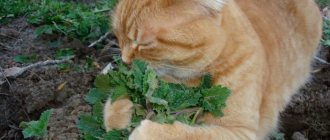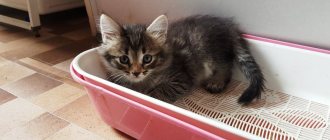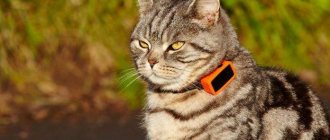Cat mint
Catnip or catnip (in Latin - Népeta catária) is a perennial herbaceous plant with a woody branched root, a tall (up to 1 m) stem, triangular pubescent leaves and whitish flowers with purple specks, collected in a corolla.
It blooms in June-July, the fruits - brown smooth nuts - ripen in August. The plant owes its name, including its Latin version, to special attention from representatives of the cat family. Moreover, not only domestic pets show interest, but also their wild counterparts - lions, tigers, pumas, lynxes, etc.
When animals smell catnip, they become excited. They can pounce on it, chew it, roll around and roll on the floor, and purr loudly. Some cats just sit there with glazed eyes and drool, others become hyperactive and run around in circles around the house.
Useful properties and indications
Cat owners should know that a small amount of mint is beneficial and even necessary for cats. What are its beneficial properties:
- Correcting your cat's behavior. With regular use of this plant, an overly active or aggressive animal becomes more balanced, and passive cats, on the contrary, become cheerful and full of energy.
- Stomach treatment. The herb has an antibacterial effect. Its benefit lies in relieving pain in the gastrointestinal tract.
- Removing parasites from the body. When used regularly, the herb helps remove worms from the cat's body.
- Preparing for stress. Owners are advised to give catnip extract to their animals before long trips. Since the herb has a calming effect, it will help the animal cope with anxiety when visiting a veterinarian.
- Improving the animal's appetite. The grass has a beneficial effect on the cat's digestive system, improving appetite in those animals that eat less than normal.
- Training to use a scratching post. It's no secret that many animals love to sharpen their claws on furniture. In order to accustom the animal to a new scratching post, it is recommended to sprinkle catnip on and near it. In a similar way, you can accustom an animal to a bed or house.
Why such a passion for inconspicuous weed?
Catnip contains an essential oil whose main ingredient is nepetalactone . This is what has a powerful appeal to many cats. For many, but not for all.
Approximately 70% of cats react to catnip, but the remaining 30% are indifferent to it. That is, every third cat is not susceptible to this plant. Why?!
A special gene is responsible for sensitivity to nepetalactone, and not all cats have it. Thus, the addiction to catnip is genetic.
Interestingly, the effect of the grass on a cat lasts 5-10 minutes and appears again no earlier than an hour later.
What other stimulants work on cats?
Although catnip is the most well-known stimulant for cats, the researchers noted that there are many other plants that can alter a cat's mood and behavior. Siegel, for example, talks about matatabi, or silver vine (Actinidia polygama). This plant grows in Japan and China.
In an experiment conducted at Japan's Osaka Zoo, large cats exposed to large amounts of the active substance matatabi showed signs of intense pleasure and addiction.
«This plant contains secondary compounds closely related in chemical structure and behavioral activity to nepetalactones
" explains Siegel.
A 2021 study confirmed that matatabi may be as effective, if not more effective, than catnip. The study authors also identified two other plants that had a similar effect: Tartary honeysuckle (Lonicera tatarica) and valerian (Valeriana officinalis). Nearly 80% of domestic cats in this study responded to matatabi, and about 50% of cats also responded to Tartary honeysuckle and valerian root.
«Silvervine, Tartary honeysuckle and Valerian root have the same properties as catnip
", the researchers conclude.
How it works?
It is not clear exactly what causes the “catnip reaction.”
- The grass has a strong, distinctive odor and a pleasantly bitter taste that attracts cats.
- The plant's main active ingredient, nepetalactone, is chemically similar to a hallucinogen. However, it is harmless and non-addictive
- There is an opinion that catnip has an aphrodisiac effect - it provokes sexual desire in cats (most likely the smell of the herb, reminiscent of the urine of a sexual partner, is responsible for this)
- Perhaps it exacerbates predatory instincts in cats
And then it’s clear why cats of reproductive age are most susceptible to grass. And in kittens up to 8-12 weeks it does not arouse interest at all.
Is catnip bad for cats?
Within reasonable limits, no. The herb is harmless when ingested by an animal. It is a common component of cat toys, applications for scratching posts, beds, and play complexes. However, you shouldn’t get carried away - for maximum effect there should be a little weed - just a pinch for the mood
BUT! As always, there is a but. If used incorrectly, catnip can become explosive. Much here depends on the cat’s temperament and its mood at a particular moment. Calm cats tend to have a muted response to mint. But in bully cats, troublemakers and creators of problems when communicating with other pets, harmless weed can cause overexcitation and an attack of aggression (!).
In addition, in its pure form, catnip essential oil can be toxic to cats.
The owner should once find out exactly how his pet reacts to catnip
Note to the hostess Catnip is an unpretentious plant; it can be grown without effort in a summer cottage or at home. When using mint commercially, all its parts are used. Therefore, when purchasing grass in free form, preference should be given to a product that retains the greenish color and herbal smell and contains more leaves and flowers than stems, since they contain the highest concentration of nepetalactone.
Another plant is of even greater interest to cats.
Can cats have catnip?
What is catnip?
Catnip is a perennial herbaceous plant of European-Central Asian species.
It is found in Russia, Western and Central Asia, Central and Southern Europe, India, Nepal and Pakistan. Grows on forest edges, wastelands, along roads. Many people grow an unpretentious plant in their front gardens or at home. The official name of catnip is catnip (lat. Népeta catária). Apparently, the plant owes its name to its striking effect on most cats, both domestic and wild. However, catnip is mainly used in areas far from the pet industry: medicine, cooking and perfumery.
Why do cats love catnip?
The reason why cats are partial to catnip is the essential oil nepetalactone. Its content in the plant is approximately 3%. Nepetalactone has a rich aroma similar to lemon. This scent acts as a pheromone on cats and attracts them at the genetic level. A wild panther experiences the same delight from catnip as a plush domesticated Briton.
How does catnip affect cats?
The scent of catnip causes a cat to change its behavior dramatically. She forgets about pranks and noble cat integrity: she becomes incredibly affectionate, begins to purr, roll on the floor, rub against the source of the aroma, tries to lick it and eat it.
Many cats stretch out to their full height and take a sweet nap. Hyperactive cats relax and calm down, while indifferent couch potatoes, on the contrary, perk up and become curious.
Such euphoria lasts 10-15 minutes. Then the pet comes to its senses and for some time loses interest in the plant.
Catnip is believed to act as a pheromone on cats. To one degree or another, it causes imitation of sexual behavior, but not all cats are sensitive to it.
Cat does not react to catnip
Kittens up to 6 months (that is, before puberty) are indifferent to the aroma of the plant. Approximately 30% of adult cats also do not react to catnip, and this is completely normal. Sensitivity to the plant is usually inherited. If your kitten's mom or dad loved catnip, he will likely follow suit as he grows up.
Catnip Vs Valerian
There is another plant found in nature that cats are partial to. This is Valerian officinalis, also known as "cat herb", "cat root" or "meow grass".
Valerian is used to prepare medicines for nervous tension and sleep disorders. But these drugs are for people, not for cats!
Ask any veterinarian, and he will answer that valerian should not be given to cats for fun or to combat stress. This is a matter of not only health, but also the life of the pet!
If catnip does not cause addiction or side effects, then valerian is like a dangerous drug for cats. It puts a huge strain on the body's cardiovascular and digestive systems and can cause hallucinations and attacks of fear, nausea, dizziness, and convulsions. A cat can die from too much valerian.
Catnip is harmless and non-addictive. Whereas valerian is dangerous to the health of the animal.
Can cats have catnip?
Catnip is absolutely safe for a healthy cat. It is not addictive and has no side effects. However, if you have nervous system disorders or an overly emotional reaction, it is better to keep the miracle herb away from your cat.
Is catnip harmful to cats?
Cat meth is harmless to cats. There is only one risk of stumbling into “trouble”. Catnip is best smelled rather than eaten. If your pet eats a lot of catnip, it can cause stomach upset.
If you want to pamper your pet with delicious grass, it is better to give him sprouted oats.
Benefits of catnip for cats
The property of catnip is highly valued in the pet industry, because catnip is an excellent assistant in correcting the behavior of purrs.
- Do you want to train your cat to use a scratching post? Choose a scratching post with catnip
- Do you want to engage in a game? Catnip toys will help
- Train him to sit on a bed? Spray your bed with catnip spray
- Relieve stress or just pamper? Toys and treats with catnip to the rescue!
You can buy scratching posts, toys, treats and catnip sprays at any pet store. Rest assured: they will only benefit your cat!
Friends, tell me, do your pets react to catnip?
Valerian
Valerian officinalis or Cat's grass (oops!) is a perennial herbaceous plant up to 1.5 m high, with several erect stems, pinnately dissected leaves and small fragrant flowers.
Blooms almost all summer. But the main interest is the rhizome - short, thick, with many thin roots, with a strong aromatic odor. This is what is used in medicine.
Valerian affects both humans and cats. Only if for people it is used as a sedative (soporific, calming, relieving emotional stress) agent, then for cats (and other felines - lions, tigers, pumas, etc.) valerian has exactly the opposite effect.
Valerian root extract contains actinidin , and its odor (as with catnip) is similar to the smell of cat urine, which causes a sexual response in them.
A period of excitement (5-20) minutes is usually followed by a relaxing sleep.
How to grow catnip at home
If you don’t want to give your pet store-bought grass, you can grow your cat’s favorite grass right at home in flower pots. To do this, it is enough to meet a few simple conditions:
- Seeds or seedlings must be purchased from specialized pet supply stores. You can also ask for a cutting from friends who are already growing this herb.
- To make the plant comfortable, you need to choose a medium-sized pot - 20 cm in diameter.
- Catnip mint does not require a large amount of land, which significantly reduces the financial costs of planting it.
- The place where the plant will be planted should be well lit by the sun, but at the same time the pot should not be within easy reach of the pet.
Usually, when planting, the pot is only half filled with soil (5-7 cm). Seeds are sown at a depth of one or one and a half centimeters. To speed up growth, it is recommended to cover the pot with film, thus creating a kind of greenhouse. The first shoots appear approximately at the end of the second week after planting.
After the seedlings grow, it is necessary to find the strongest shoots. Weak plants must be removed in order to open up more space for strong ones. The sprouts can be further strengthened by tying the stem to a straight stick or wire.
Impact
Drug? Quite possible.
The behavior of cats under the influence of this plant is very similar to intoxication - the animal clearly enjoys it and is very excited. In any case, valerian has a powerful effect on the animal’s nervous system, and this is not good. So you shouldn't abuse it. Especially for fun. Valerian in plant form does not cause harm to the cat’s body, but medications based on it (concentrated alcohol tinctures) may be unsafe.
Valerian is contraindicated in pregnant cats, as well as animals with liver or kidney problems.
Since one of the abilities of valerian is to relax smooth muscles, it reduces spasms in the digestive tract and is recommended for cats with gastrointestinal problems.
Again, as with catnip, cats' reactions to valerian can range from complete indifference to overstimulation, aggression, and even sexual activity. Here are typical examples of the effects of valerian, taken from an online forum:
There are other plants that have an emotional effect on cats, for example, honeysuckle, thyme (thyme).
Advantages and disadvantages
Catnip has its pros and cons. Their manifestation is particularly individual for each pet.
Pros of use:
- Behavior adjustment. It has long been noted that with the help of this plant, aggressive cats become more calm and docile.
- An excellent remedy for restoring appetite in cats and relieving stomach cramps.
- It is a bactericidal agent and kills worms.
- Relieves stress when moving, visiting the veterinarian.
- Does not get used to the smell of catnip.
Minuses:
- Depletes the nervous system.
- Not safe for pregnant cats.
It is necessary to observe the behavior of your pet when using this plant. If the cat reacts strongly to the smell, becomes aggressive, inadequate, then you should abandon it and use another one.











